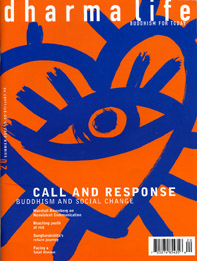Shin Buddhism
Bits of Rubble Turn into Gold
Taitetsu Unno
Doubleday 2002, $12.95/£10.95 p/b
Taitetsu Unno's earlier, very readable, introduction to Shin Buddhism, River of Fire, River of Water, offered a sketch of the main themes of Shin Buddhist teaching and practice and, despite its claim to offer 'a complete overview of the tradition', this new book continues in this vein.
Taitetsu Unno is not only one of the leading scholars of Shin, he is also a practitioner, and this fact shines through the pages of this book. Unno speaks with a committed voice, which makes this a heartfelt, personal introduction to Shin's main tenets, a book of faith not merely of scholarship. He uses modern poetry and personal anecdotes in addition to traditional sources to illustrate his points.
Pure Land Buddhism is perhaps one of the most unusual flowerings of the Dharma and, until now, it has not made much of an impression on the western mind. Indeed, at first glance it can appear to contradict basic principles of early Buddhism.
The evolution of Shin is long and complex but its primary inspiration comes from the Pure Land Sutras of Indian Mahayana. These focus on the figure of Amitabha/Amitayus (Amida in Japanese) who, in a past life, vowed not to gain Enlightenment unless, when he did so, all beings who called his name sincerely would be reborn in his Pure Land. This is Amida's famous '18th vow', the theological basis of Shin. Shin teaches that, since Amida did go on to become Enlightened, it must be the case that those who call his name will be born in his Pure Land. While this legend may seem dubious, it nevertheless spawned one of Buddhism's most profound expressions.
Shin Buddhism (more properly, Jodo Shinshu) takes more specific form in the life and teaching of Shinran Shonin (1173-1263). Originally a Tendai monk, Shinran became a disciple of Honen after experiencing a deep spiritual crisis. Honen encouraged the recitation of the phrase namu Amida butsu as the primary spiritual practice and Shinran took this up. At the heart of Shin is the experience of shinjin, which is often translated as 'faith' but Unno's 'true entrusting' perhaps expresses its meaning better. It is certainly not faith in some unknown or unseen power but an inner spiritual revolution. The arising of shinjin is a profound experience in which we realise simultaneously that we are both a foolish being and that our mind is non-different from the mind of Amida Buddha.
This dual realisation brings about not only humility, since we recognise how thoroughly we are ensnared by ignorance, but also joy and gratitude, since despite our shortcomings we are identical with Amida. This experience may be expressed as a movement from self-power (jiriki), the belief that through our own efforts we can gain spiritual liberation, to other-power (tariki) where we recognise that our only hope of salvation is for Amida to endow us with his qualities. realise have been 'grasped never be abandoned' by Amida's compassion and so, in this sense, shinjin becomes a permanent spiritual condition.
Any 'practice' that follows the arising of shinjin is not undertaken with a view to self-liberation but is offered out of gratitude to Amida for ensuring our future Enlightenment. We live in a constant state of grace, where Amida's virtues are perpetually entrusted to us; the bit of rubble that is our ordinary, limited self is constantly transformed into the gold of Amida's compassionate heart-mind. Paradoxically, this experience is at once profound and ordinary; our life becomes characterised by naturalness (jinen). We drop pretence, pride and self-importance, and begin to live spontaneously without calculation. Ours is an ordinary life that is simultaneously extraordinary because it is lived within shinjin.
For some, all of the above may set alarm-bells ringing, since Shin has striking similarities to some Christian theology, particularly in its Lutheran form. For those trying to escape the confines of Christian dogma, Shin may seem to be re-importing God. Perhaps most importantly, Shin undermines the widely cherished modern view that we can improve or even 'save' ourselves. For Shinran, this is folly and simply reveals how deeply we are bemired; our only hope is to entrust ourselves to Amida and embrace the compassion that is constantly reaching out to us.
There is a much work to do to make the central message of Shin Buddhism comprehensible to a post-Christian audience and Unno, among others, is pioneering this. I recommend his book and its predecessor as starting points for exploring the main themes of Shin teaching. But the Shin message is more subtle than it first appears and a grounding in basic Buddhist doctrine is essential to understand the issues it confronts. It is easy to misread and misapply the apparent simplicity of the Shin message and perhaps assume that one simply stops making effort because one has 'already been saved'. But intellectually adopting the view that one is destined for the Pure Land is a long way from the profound spiritual transformation that Shinran intends.
Nagapriya is involved with Dharmavastu Buddhist study project



